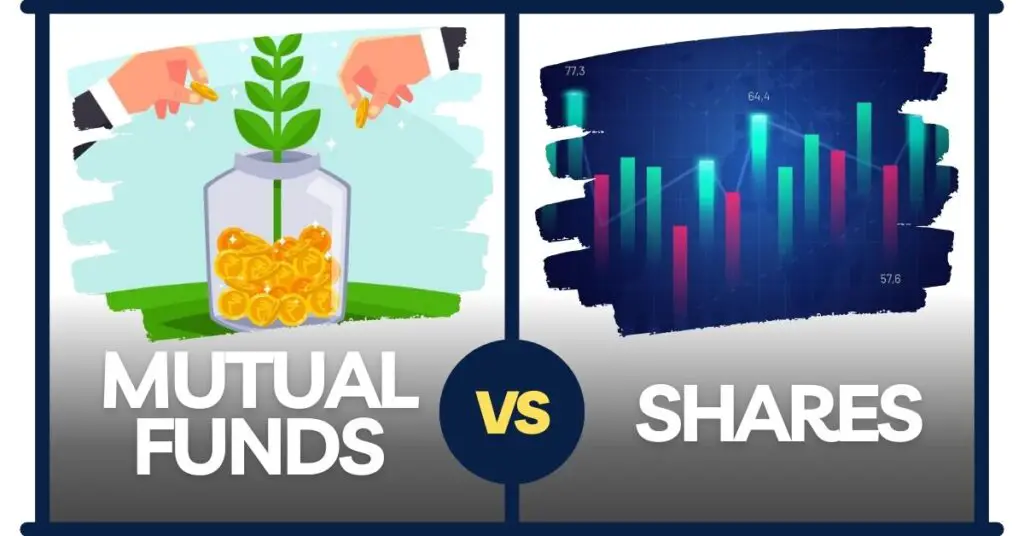Confused of difference between mutual funds and shares? Here we have explained in detail to give in depth clarity and help you choose better.
We all have heard the advice that propels us to plan our investment, whether buying Mutual funds or shares!
But what’s the key difference between both? Which one’s meant for whom? Let’s uncover everything in this blog.
The Basic Definition of Mutual Funds and Shares
Mutual funds are investment funds that work like a trust and collect money from different investors to buy stocks, securities, and bonds.
They are managed by experienced fund managers who make investment decisions in place of the investors.
When a person invests in a mutual fund, they own units or shares of that particular fund, and their returns are calculated and depend on the fund’s overall performance.
On the other hand, Shares, also known as stocks or equities, represent ownership in a company. When a person buys shares of a company’s stock, they become a partial owner and are given certain rights.
One advantage of being a shareholder is that they can benefit from the company’s profits through dividends. Moreover, they trade their stocks anytime at a higher price than they paid.
In this detailed guide, we will find out the difference between mutual funds and shares and give you a better understanding of each of them.
Characteristics of Mutual Funds & Shares

Characteristics of Mutual Funds:
- Mutual funds pool or collect money from various investors to build a variegated portfolio of stocks, bonds, or different securities. This diversification helps spread risk.
- Mutual funds are managed by experienced fund executives who make investment decisions in place of investors and aim to maximize returns.
- Investors can buy or sell mutual fund shares on any business day, which then provides liquidity. The fund’s price is decided after the trading day and is based on the net asset value (NAV).
- A mutual fund’s risk and return possibility often depends on its underlying assets.
Characteristics of Shares:
- When a person purchases shares of a company’s stock, they become a partial owner in that company, which gives them some rights, such as voting at shareholder meetings, etc.
- Shareholders can also get dividends. A dividend is a portion of the company’s profits that are paid to the shareholders.
- Stock prices can be highly fluctuating at times and impacted by factors like how the company is performing, market sentiment, as well as economic conditions.
- Stocks are liquid assets that can be purchased and sold during trading hours on stock exchanges.
- The risk and potential returns associated with shares depend on the performance of the individual company.
>> 5 Best Stock Analysis Website India
Risks And Returns Associated With Mutual Funds & Shares

Risks Associated with Mutual Funds:
- Mutual funds are subject to market fluctuations. In case the markets don’t perform well or undergo losses, the value of your investment in the fund can decrease.
- While experienced fund managers make investment decisions, there’s always a risk that their strategies might not produce the desired returns.
- Mutual funds charge high management fees, which can eat into your returns and can impact your overall gains.
Returns Associated with Mutual Funds:
Mutual funds give you:
- Instant diversification.
- Spread risk across various assets.
- This could potentially reduce the overall risk of your investment.
Moreover, the expertise of fund managers can result in effective investment decisions, which can lead to competitive returns.
Risks Associated with Shares:
- The value of shares is highly sensitive to market conditions. Poor market performance can lead to considerable losses.
- Shares of individual companies are vulnerable to poor management decisions, industry challenges, and economic downturns.
- Investing in individual stocks can lack diversification, which leads to concentrated risk exposure.
Returns Associated with Shares:
- Owning shares provides voting rights and the possibility to receive dividends, which can contribute to returns.
- Shares let investors benefit from the success of individual companies, which then provide substantial returns.
- Shares are highly liquid and allow you to buy or sell in real-time during market hours.
>> Master the Difference Between Index Fund And Mutual Fund
How to Choose Between Mutual Funds and Shares?
Consider these points if you are confused about choosing between Mutual Funds and Shares.
1. Define Your Goals:

If you have short-term financial objectives or need liquidity, shares might be suitable due to their high liquidity.
Mutual funds might offer better diversification and stability for long-term financial objectives, such as retirement or wealth accumulation.
2. Analyze Costs:

Evaluate the costs associated with both options. Mutual funds might have management fees while buying shares involves brokerage fees.
3. Consider Tax Implications:

Mutual funds can have tax advantages due to professional management, which can reduce your tax burden.
4. Seek Professional Advice:

Confer a financial advisor who can evaluate your unique financial situation and provide personalized recommendations.
5. Diversification:

Mutual funds can be a better choice if you prefer a diversified portfolio without the hassle of selecting individual stocks.
Besides that, you might want to invest in shares directly if you have specific knowledge or preferences for certain industries or companies.
>> Stock Market Blogs India to Master Investing
Conclusion
Hope this detailed guide has helped you to grasp the difference between mutual funds and shares. Mutual funds offer diversification and professional management, while shares offer more hands-on control.
If you want to make a good and informed choice, consider your financial goals and ability to take risks. No matter what option you choose, always remember to educate yourself continuously.
You must also seek professional guidance to make decisions aligned with your financial aspirations.
Disclosure: Please note that some links on relearnfinance.com are affiliate links. We may receive a commission at no extra cost to you if you click through our links and make a purchase from our partners.




Pingback: Stable Money Review: Is It a Good Platform to Invest In?